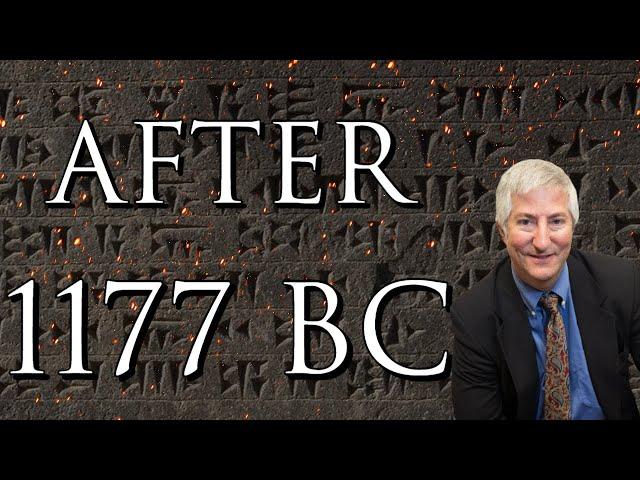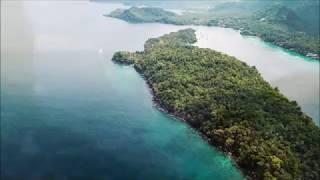
After 1177 BC and the Bronze Age Collapse ~ With Dr Eric Cline
Комментарии:

Just finished 1177 BC - can’t wait for the sequel
Ответить
Interesting interview. When studying ancient Near East history, is it best to start from the beginning with the Canaanites, Israelites, Egyptians, Hittites, Assyrians, Babylonians, Aramaeans, etc.?
Ответить
Is the book out?
Ответить
I trust that Dr. Cline won’t ignore evidence that doesn’t align with his own historical narrative. ✔️
Ответить
I can’t believe I didn’t see this 2 years ago!! I frikkin love Dr. Cline.
Ответить
The way i find out bronze age collapse was by counting my Ancaster 4,8,16... we are 8.5 billion people to get that number you need to go back 3200 years / 1200bc so i checked what happened that time and yep itbmakes sense now we restarted are civilization again and looks like we will do it again 😀
Ответить
I would love to read about parallels to modern times, and your considered extrapolation re suggestions for modern families/communities to weather current times.
Ответить
The Bronze Age Collapse has been solved.
Israel did it, under Moses and Joshua. Moses literally claims he's going to totally destroy the Hittites which happened in 1177 BC, and which was perhaps the central event of the Bronze Age Collapse. Joshua claims the destruction of a number of cities that are still recognizable, including Kadesh.
All proof on my channel.

VERY SMART MAN
Ответить
IT WOULD APPEAR THAT THE RECOVERY CONTINUES
Ответить
Seems Egypt imploaded into a regressive theocracy.
Ответить
#😜😜😜😜
Ответить
What was happening outside of the Mediterranean region during the Bronze Age Collapse? Did ancient China Collapse? Did other citizations collapse?
Ответить
Such a fun historian
Ответить
Totally agree
Ответить
Good luck on the new book, Dr. Cline: looking forward to it!
Ответить
Great videos, just followed Dr. Cline on Amazon, looking forward to buying a book soon.
Ответить
When i write i say im quilting it together
Ответить
If David Rohl is right, nothing much happens, because the chronology is wrong. Short book!
Ответить
I luv Dr Cline, he's cool, so glad I found him. Nice to get this calibre of academics online.
Ответить
It would be nice to have a chapter exclusively on the economic aspects of the decline leading to 1177BC and then of the slow recovery.
Ответить
I’m looking forward to the audiobook!
Ответить
This is so exciting! Will keep an eye out for this book when it's finished!
Ответить
It might be interesting todo see what happened (after 1177) with peoples in the Caspian Sea. Also, I wonder if it is possible to find out something about the fate of descendants of hitite royalty. Any great, great grandson or daughter of Puduhepa going around? What about their knowledge? What happened to the hurrites in her home town? Another question I have is who, when, where and how steel production started and developed. I will be looking forward your findings. Good luck.
Ответить
(To Dr. Cline): are you planning on discussing the Philistines and their link to the Achaeans? Because it has more or less been confirmed that the Phillistines were a mixture of Greeks and Minoans who were affiliated with the Sea Peoples. Additionally, it would be interesting to hear your thoughts on the thematic links between the Homeric Epics and the Books of Judges and Kings. The Phillistines are described in much the same way as the Achaeans are. And “Goliath” fits the “Hero” archetype almost perfectly.
People like Durant characterize the Achaeans as a dark age people (that is probably because “Homer” had Greek society reflect how it was in his time). But what if they, and the sea peoples as a whole, were not, in fact, Barbarians, but a seafaring imperial army attempting to construct a Toynbean “universal state”?
Just some thoughts I had, and ones that I am discussing in my own book (a generalist study of history focusing on the philosophical examination of various world cultures, synthesizing the systemic/empirical model and the morphological model of cultural development).
Your work has been a major help to the development of my own book, and it would be really fantastic (and useful 🤣) to hear thoughts on such topics from a trained historian.

Can’t wait! Just finished the first one after months on my bookshelf. So glad that he’s doing a sequel. Another resource to use for my own book on the rise and fall of civilizations!
Ответить
Yes! Chronological is much better.
Ответить
Nick and Eric, can I take this opportunity to request a mash up that I've wanted for a few years now?
After reading "1177" I read the book 'Why Nations Fail" by Daron Acemoglu and James A. Robinson and I keep wondering how their ideas would apply to the Bronze Age and the following Iron Age nations rising out of the collapse. I want you all to come together for a discussion. Do their ideas break down when you go too far back in civilization? Are there universal truths regarding stable successful nation building? Maybe nations and international trade and how to build these successfully as so different in different epochs that it is like trying to reconcile quantum physics and astrophysics.
Eric, you did such a great job of considering the different influences and influencers of the Bronze Age collapse, could we have a discussion / incites on inclusive versus extractive institutions in the Bronze Age or the early Iron Age? Could we have a few case studies from the Bronze Age like we have in "Why Nations Fail"?
While the vast majority of people seemed to be the serfs / slaves / peasants under the monarch, even the lowliest seemed to have a cottage industry on the side that the government was not constantly interfering in, such as weaving. Karen says that Assyria gave people a way to opt out of being a citizen and paying taxes while continuing to live in the area of the kingdom. If we could get a follow-up book on the subject that would be even more awesome. Thank you so much for your time.

My vote is for going back and forth between different groups as time goes on.
Ответить
In my next life, I want to reincarnate as Dr. Eric Cline.
Ответить
I'm particularly curious about what happened i Egypt in that time. I know it survived the Late Bronze Age Collapse but was crippled and did not recover. Standard Egyptian history seems to consist of "Pyramids, weird gods, and Boom! Alexander takes over. A little bit on fill in the blank for that 800 years or so would be nice.
Ответить
Chronological
Ответить
Would love more focus on the Luwian region between the Greeks and Hittites! Especially what we may know about their contributions to classical Greek culture
Ответить
As a lover of ALL THINGS BRONZE AGE I cant wait especially after reading 1177. But, if I may? Dr. Cline, can you address a few pages on why doesn't Israel in light of the withdrawal of Egypt, the Classical Hittites and the yet to happen incursion of the Neo-Assyrians into the Levant never rise to imperial hegemony like the dynasties in the nations listed above? Only King David and maybe Solomon but no Thutmose nor Amenhotep the lll's or Suppililiumas Israel?
Ответить
I think the chronological aproach is the best in this case, i look forward for the book, maybe how the etruscans emerged, would be also cool
Ответить
But he doesn't say anything, does he? He rants a lot but he does not explain what happened after 1177.
IMO, in Greece there was a big "after the looting" party (and some reckoning), which is very generically reflected in the Odissey: skip all the travel and adventure part: he reckons he was stranded in Egypt for seven years, all the rest is a remake of "Jason and the Argonauts" but his stranding in Egypt ("Cretan lie") and the dispute for his wife/throne is probably suggestive of what was going on after the looting of Asia Minor, Cyprus and Syria in the leading country of the looters: Greece. Then, c. 1300 there is a dynastic conflict (Heraklidae) that results in the collapse of Mycenae and the decay of civilized life in general but without a clear break, not yet. Only c. 1060 there is a strong break and should be related to what happens in Egypt at the same time: partial conquest by the Meswesh (Amazigh or Berbers). This last LBA obscure episode, which razed or severely damaged all Greek cities save Athens seems to be reflected in the Atlantis "legend" (not really a legend proper, but oral history anyhow per Plato).
In Anatolia what happens is Phrygia, whose origin is surrounded in legend and seems strongly related by origin to that of Macedonians (Mushki = Makedon, Phryges = Bryges) and by later events to that of Armenians. All this is based on what Herodotus, who was native from Asia Minor, tells us, but linguistics, archaeology and genetics do not disagree, rather the opposite. Later there was a recomposition of native Anatolians as Lydia (neo-Luwians) but that's already rather well known history. It is a bit obscure how the Phrygians conquered Armenia (formerly pre-Indoeuropean Urartu) but probably it happened with Median support.
The Levant and Egypt are better known, there's some darkness re. Palestine, but almost certainly, the Hebrews displaced the late and decadent Egyptian rule, including the conquest of their Sherden and Tjekker vassals in the region (but not of the Peleset-Philistines). The rise of Phoenicians is also a bit obscure but they are clearly native Canaanites that remained loyal to their traditional polytheistic beliefs (there's El, as in Judaism, but also other gods, which in Judaism have been erased) and it's clear that at some point they exploited the vacuum of trading power left by collapsed Greece and replaced them with a clear goal in mind: Iberia (Carthage and Gadir were founded in quick succession) and its fabled (and very real) mineral wealth.
More interesting to me is Italy, where the LBA presents us with what should be identified as a major Indoeuropean invasion (Italo-Celts, mostly early Italics) with Urnfields culture (known in Italy as proto-Villanovan). There's also an Urnfields branch leading to NE Iberia (both surrounded the Ligures against the Western Alps and isolated them from other Vasconic peoples except by sea) and precursor of Iberian Celts. However IMO as we approach the Iron Age two other peoples, well known Sea Peoples to be precise: the Teresh (Tyrsenoi or Tauresi) and the Shekelesh (some type of Semites, maybe Canaanite mercenaries based on name and genetic trail) also got somehow involved in Italy, where they eventually carved two niches: the Teresh in Central and parts of North Italy (Etruscans, Villanova culture) and the Shekelesh in most of Sicily, to which they give name (and where Lebanon-like genetics are surprisingly strong, having no other possible explanation than LBA/EIA migration from the Levant, i.e. Shekelesh > Siculi & Sicels). Meanwhile in Sardinia we see an increase of Neolithic 1 type genetics (EEF, Ötzi-like), which proabably represents large influx of Italian refugees, either as invasion or peacefully. Fossil linguistics strongly support Sardinia speaking a Basque-like (Vasconic) language until Romanization (cf. J.M. Elexpuru 2017).
Iberia is also somewhat interesting because we also see collapse there but it happens in two phases: (1) the El Argar civilization, which was probably a centralized kingdom and had intense trade and cultural exchange with Mycenaean Greece (and should be somehow associated with the legends of Hercules in the Far West or Hesperia, from which Hispania surely), collapsed around 1300 BCE and did so in violent manner (fires). The surviving towns formed the "post-Argarian culture" which was probably a bunch of city-states and that leads almost directly to the latter Iberians of early history (Iberian culture, Iron Age). The other major Iberian civilization (Vilanova de São Pedro, VNSP, culture or Castro do Zambujal for its major town, still poorly researched) only collapsed later around 1100 or 1000 BCE and did so in direct relation with the sudden silting (tsunami surely) of the 10 km "marine branch" that linked it to the Ocean. In my interpretation it is this civilization which should be seen as Atlantis, because way too many details (not everything but a lot) fit with Plato's narration. I mentioned the intrusive arrival of Urnfields culture (Italo-Celts or early Celts) above, occupying Languedoc and Catalonia for at least half a millenium and expanding from them in Western direction (upstream the Ebro river, later, already inthe Iron Age, into the Plateau and the Western coast). However, coincident with the arrival of classical Greeks (Marseille and other sites) c. 590 they are displaced by the Iberians, thus Iberia's Celts (or Italo-Celts, some say Lusitanians were not Celts but "Italoids") were cut off from their continental brethren early on, before the classical Celtic culture of Le Tène and its major expansions to most of Gaul, Britain, etc. took place. That's why in most interpretations Celtiberian is very upstream in the Celtic linguistic tree: not because Iberia is the source but because they are an old isolated branch.
Otherwise in the Atlantic basin there was a very late Bronze Age all the way to c. 800 BCE, with extensive trade connections that reach to Denmark on one extreme and to Cyprus in the other, probably via Sicily (where Elymnians may have been an Iberian colony of some sort, obscure). This Mediterranean trade connection of Atlantic Late Bronze (Early Iron Age for the rest of the region already) may have been the thread that Phoenicians traders and settlers followed to forge their colonial empire.

I’d love to see India brought into this for its first philosophical teaching crossing the divide the impact on the learned of the day in the area of the world your work is upon I do believe a lot of the beliefs then stem from there as they seemed to have been the pioneers of many gods and Demi gods as well as a higher understanding in tandem with this of an Absolute truth stemming into different branches of the One and the Many and how these teaching progressed across the world by word of mouth and transferred itself to different Gods and mother worship from matriarchal to patriarchy in the corse of time ....but maybe thats another book in itself,,,
Ответить
New book Sounds great! I really cannot understand how the Greeks adopted the phoeonician alphabet. Homer did not think high of Phoenicians, he concidered them as troglodytes. And they came up with an alphabet of their own?
Ответить
I agree with him, I prefer a chronological rather than a geographical approach.
Ответить
Looks like we are getting another reboot ... great moving backwards and stuck with the mass dum bum humans:)
Ответить
Yes, showing the interconnection would be just great and the best way, my humble opinion. Just love him
Ответить
I'm so happy I found it on FB and wasnt going to miss it
Ответить
I feel the world could use a book on what was going on at the same time across countries. Typically a book, video, class focuses on 1 place / people at a time and you never quite understand how they all fit together.
To use much more recent examples from my own life where it was hard for me to reconcile concurrent events in different places, reading the Brontes with all the social rules and class distinctions in England and then reading Poe where people just get on with life (or not) I was surprised to find that the works were all written in the same time. The freedom in the US was really striking.
Then there is the Chinese Cultural Revolution. All the horror stories I've heard. Surely it took place back in the 1910s, 20s or 30s - some darker age with more limited international flights and media reporting where a nation could have a chance of getting away with such atrocities. I was really shocked to learn that the Cultural Revolution was happening the same time as Woodstock, the Beatles and the evoluation of disco. That just doesn't compute.
So, if we (some of us) still can't get our heads around more current events happening at the same time in different countries, we probably could really use some help with the post-Bronze Age collapse landscape and players as well. Whatever you write, I will obviously find room for it on my bookshelf next to your other books.

Yes. It's your approach will be interesting for the readers. As one Russian writer used to say that we are studying history of different states as we are sailing parallel rivers which never crossing.
Ответить
This is a very important and intriguing subject, Thank you for talking about it. I really want to know how the Assyrians got back up on their feet and did what they did after the Bronze age collapse. Also what happened in Greece, Italy and North Africa in that period.
Ответить
I look forward to reading "After 1177." I agree that a chronological format would be good to show the interconnections. Hopefully our civilization won't collapse before the book gets published.
Ответить

























